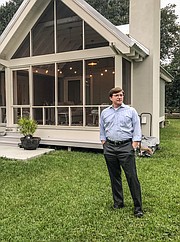Wednesday, October 31, 2018
David Baria (middle) celebrated his Democratic primary victory with his faimly, including (left to right) his son Max, daughters Merritt and Bess, and wife Marcie. Photo by Ashton Pittman.
It is Oct. 24 when the leader of the Mississippi House of Representatives, David Baria, welcomes me to his Bay St. Louis home, where his dog, Oscar, immediately greets me. In just 13 days, Mississippians will decide the fate of the Democrat's bid for U.S. Senate.
Baria introduces me to his, wife, Marcie, and their 10-year-old son, Max, whom they adopted in 2008. The bookshelves in the living room contain photos of the Baria family. He points to a photo of his daughters, Merritt and Bess; he starts to call them his "teenage daughters," before reminding himself they're in their early 20s now.
Then, he shows me a photo of their firstborn, Darden. In 2005, the Barias lost their home in Hurricane Katrina. A month later, they lost far more when Darden, age 10, died after he was infected with the rabies virus. His was the only rabies death in the U.S. that year, and the first in Mississippi since 1948.
Baria brought me to his home to finish a conversation we began two blocks over on the porch of the Mockingbird Cafe. It was there that, two years after his family's devastating loss, Baria first announced an unlikely bid for the Mississippi Senate. At the Mockingbird and his home, the man who currently serves as the House minority leader in the Mississippi Legislature shared his story, his plans for Mississippi, and why he thinks he can move the state forward.
How did you get into politics?
It started right here in Bay St. Louis at the Mocking Bird Cafe. This is where I announced my very first run for office.
We went through Hurricane Katrina and lost everything. We came back to an empty lot where there was a house. We lost my grandma's chifferobe and the paintings that my brother-in-law had painted. My wife was an art student; all of her art was just gone. That was a devastating thing to come home to. But it's just stuff. You rationalize that it's just stuff.
But a month later, we lost our oldest child, Darden, and that was totally devastating. There was a long time where we were just—I don't know how to describe it—just barely functioning, but we had two children, so we had to function as parents and adults. But when we were able to pick ourselves up and dust ourselves off, we got really involved in the community.
(Marcie) did a city beautification project around here. Then she started a city recycling program in the school system, and the kids with the most recycling in a week would get a pizza party. Then, she started a nonprofit called Recycle Hancock, and they focused on blueways and greenways to beautify our county and bring it back better than it was. That's what she focused on. She got real involved in our church, and my focus was on trying to move Mississippi from 50th place. That's what prompted me to get involved in politics.
I ran in 2007 when we were still in the midst of a recovery from Hurricane Katrina, and the reason I ran is because we had decided to get more involved in our community. We were going to community meetings, and I would look around, and I would say, 'Who's here? Is our mayor here? Council here?'
And I never saw the person who held the seat for our Mississippi State Senate. And so I decided that I would run against him.
People didn't give me a chance because he was from a very large family from here in Hancock County and there were just two Barias who were old enough to vote in this county—me and my wife. I was certain I was going to get my vote, not so certain about my wife. So I said, "You tell me I'm not going to win this? Well, watch me go to work." So I treated it like a job from day one. I knocked on every door in this county, and I won that race by 37 votes. So that's how I got into politics, and that's how I won my first election.
How did the losses you experienced affect the way you approach politics and people?
I think that those kind of losses, and the fact that there was a point in my life where I had to think about the basics—like how to put food on the table, clothes on my children's back, a roof over their head, and a dry place to sleep—it gives you empathy with people in similar circumstances.
There are people going through that right now in this county and in this state and in this country. And I think that you have to have that kind of empathy to be able to understand not only what they're going through, but to be able to craft policies that will lift those people up and unite us all as a people.
I think that's one of the things our president is sorely lacking: empathy. And I think if he had some more empathy, he would speak differently and act differently. I don't know my opponent's story—I only know my own—but I think that's one reason I connect with people from all walks of life. I've been through some things that other people haven't. I have, obviously, a child of color. I've experienced the highs life can offer as a successful trial lawyer. So I've been there, done that, and seen almost everything at this point. I think that gives me a range of experience that most people don't have.
What can we do to improve health care in Mississippi?
By refusing to accept expansion of Medicaid under the Affordable Care Act, we've weakened our system, we've created financial burdens on our small rural hospitals that are unable to bear it, and we've failed to provide a payment mechanism for 300,000 of our brothers and sisters who need medical care just like the rest of us. And we stupidly failed to create 8,000 to 9,000 good, high-paying medical-industry jobs.
We have been unable to convince our leadership at the Capitol—whether the speaker or the lieutenant governor or the governor—to revisit the issue of expanding Medicaid. So the only thing I know to do is to change out the leadership and to change out some members of our Legislature so that we can then make this policy decision that would be beneficial to all of these people, all of these entities, all of our communities.
What could you do to improve our health-care situation on a federal level?
If you take it writ large on a federal level, 14 states have refused to expand Medicaid under the ACA. And so they all have similar problems and we see that playing out in other states. And we see in other states that, when they hire a new governor or make the decision through a ballot initiative, their health-care outcomes and their health-care system improves, and people are healthier. A healthier workforce is a more productive workforce. So we know this to be true, and we ought to be all about trying to make our citizenry healthier.
At the federal level, We could and should work together in a bipartisan fashion to fix the ACA. The ACA was not perfect, but it was a damn good start in trying to fix our health-care system. And what should have happened is, once the fight was over, people should've come together and said, "This is what's good about it, this is what's bad about it; let's work together, and let's try to fix it and improve health care for our entire country."
But as we know, that's not what happened. The Republicans voted 70 times in the House to try to repeal without a replacement system for the ACA. And now, what they've decided to do—since they were unable to repeal it—is to just undermine it and let it fail of its own weight.
And we see they're taking votes on junk healthcare policies that would allow healthcare companies to deny people with pre-existing conditions, and they're intent on trying to crater the ACA.
So if I was a U.S. senator, I would be doing everything in my power to do at least two things. One, mandate expansion of Medicaid for all states. Just change the language the Supreme Court found discretionary and make it mandatory. I would never vote to weaken coverage of pre-existing conditions. Then, I would reach across the aisle to my colleagues on the side who agree we have health-care problems in America.
Why do you think incumbents like Sen. Roger Wicker refuse to debate opponents, and how do you view the role of an elected official in terms of accountability?
I think it's part of the job description of a member of Congress to be accountable to the people they represent. That means not only being accountable at the ballot box every six years, but coming back into the community and listening to what voters have on their minds, what they think, what they feel like they need from their government, what they feel they need from you as an elected representative, answering their questions, and articulating your positions on various issues of the day that are important to your constituents. And part of that process means coming back and holding town halls and meetings with people. I think that people expect that and deserve that, and I think our current group of elected representatives is completely out of touch because they refuse to do that. I think debates are a part of that.
On the accountability piece, I've been telling people, when I'm your U.S. senator, I'm going to hold at least one town hall in each congressional district at least once a year. And I've talked about telephone town halls where you can bring thousands of people onto the phone at one time, and you can speak to them and listen to them and answer questions.
That's free to members of Congress, and it doesn't cost a thing. So congressmen ought to be taking advantage of that because it's part of being accountable. And look, it just seems to me like a good idea if you want to know what policies the folks you're asking to vote for you want to see enacted, then you've got to listen to them.
The debate piece is another part of accountability. And I think the polls show that a majority of people expect for their elected representatives to come and stand before them and stand up next to the person who is running against them and talk about the issues, answer questions from voters, and let them judge for themselves who would be the better representative. But again, our congressional delegation just runs and hides.
It, to me, is sad, and it's shameful that Roger Wicker has been serving us in Washington for 24 years as representative and a senator, and he feels like he's incapable of coming back to Mississippi and standing on a stage with me and debating the issues. That's part of his job description. And he is asking the voters to rehire him for another six years. And I believe that if you are incapable of doing that, you don't deserve the job.
Do you think Sen. Wicker has been too deferential to the president?
Absolutely. I think he has been supine before the president. I believe that it's not just Roger Wicker, but a lot of Republican senators and U.S. House members have failed to do their jobs as a co-equal branch of government and to stand up. When this president—or any president—does things you don't believe best reflects the interests of your state or your country, you have a duty to stand up and say, "This is wrong, I don't agree with this, and here's why." My opponent has found himself incapable of doing that.
End Citizens United, a super-PAC, endorsed you. What are your views on campaign finance reform?
I'm in favor of it. I think there's way too much money in politics. There's way too much money in a race like mine—in a statewide race. We're proud of the fact that, as a person who's never run statewide before, we were able to raise over $900,000—which is a lot of money to run in Mississippi. It takes a lot of money to run statewide.
But when you look at what the presidential candidates spent in 2016, it's just a gross waste of resources in my view. And we also have folks who are able to contribute huge amounts of cash—dark money that goes unreported—and they have an outsized influence on those that they contribute to and on our policy in this country. I think our founders would be rolling over in their graves if they knew what we were doing with Citizens United and the way money was being raised and spent in politics.
You're not accepting money from corporate PACs, but you did accept money from leadership PACs affiliated with several sitting Democratic U.S. senators and a Democratic governor, and those PACs accept corporate money. How does that square with your pledge not to accept corporate money?
Well, I wasn't aware of that until you just told me that. I did not have an appreciation for the fact that they accepted corporate money. But in my view, the reason why I accepted those contributions is because those are individual members I'm going to be serving with or working with in the case of (Louisiana) Gov. John Bel Edwards. And if they felt strongly enough about investing in my campaign, then I was proud to get those checks because then I could say, look, Gov. John Bel Edwards or Sen. Sherrod Brown or Sen. Kamala Harris or Sen. Chris Van Hollen felt strongly enough about my campaign to contribute.
Now that I know what you've just told me, I would say this: The reason why I haven't accepted corporate PAC money is because I want people to understand that no corporation is going to have any influence over me. I've spent 28 years representing individuals against corporate America—against big insurance companies and big corporations. Just look at my opponent's FEC filings, and you will see what I'm talking about.
I am going to Washington for one reason and one reason alone: that is to represent everyday working Mississippians. The kind of people who, like my parents, had to work paycheck to paycheck. The kind of people who live right here in Hancock County who work paycheck to paycheck. They don't have enough influence in Washington. They need somebody like me.
You support repealing the Hyde Amendment, which prohibits federal funding of abortions. What about those who say they don't want tax dollars to pay for abortions?
To me, it's all about fairness. If only wealthy women can seek services for their health care, and poor women can't, it's not fair.
It's just like, for years, Ireland had a ban on abortions, which meant only wealthy women who could afford a plane ticket and a doctor outside of the country could avail themselves of that service. It meant that poor Irish women had to bring those pregnancies to full term, whether they were created by incest, or rape, or whether their health was in jeopardy, or whether the viability of the fetus was in jeopardy. I would say that that is unfair.
You've said your son, Max, who is mixed race, is part of the reason you want to change the Mississippi state flag. Can you explain that?
This is what I would call a learned experience rather than a lived experience. I didn't grow up as a person of color, obviously—I'm an extremely white dude. But as I grew and matured, I began to talk to people who expressed to me their feelings and their concerns about the Confederate battle flag. When I was a kid, I had one in my bedroom. I don't anymore, and none of my children did because I'm more enlightened about it now because of my life experience.
When I talk about my son in connection with the state flag, what I've said is this: He was 7 or 8 when the (Charleston) South Carolina (church) shooting occurred, and that was followed with Charlottesville (Nazi marches). And you see the connection between white supremacists, the KKK and other hate groups, and that rebel flag. Regardless of what it was originally intended for, it is now the banner of white supremacists and hate groups.
As I considered what I was going to do about it, I thought, I have a son who probably doesn't understand this right now, but one day, he's going to be an adult and know that his father held elective office in Mississippi with a state flag that had the stars and bars on it. And what is he going to think of me if I don't use the platform that I have to be outspoken about removing the current state flag and putting it in a museum?
If Bubba wants to put a rebel flag in the back of his truck and drive up and down the highway all day long every day, that's his prerogative. That's fine. But our state flag with the rebel flag within it should not be flying over public buildings and universities and places we all have to access. We need to put it in a museum. We need to get a flag we can all rally around. Flags should not be controversial, and this one is.
Have you learned things as Max's father that a white parent might not typically understand?
Absolutely. He's now 10 years old, and he watches the news—he can't help it having a parent who's running for office—and he sees what happens out there when young black men get arrested and tased and sometimes even shot by policemen.
I have told him since he was a little boy that police are here to protect us, that they run to the problem when other people run from the problem and that we should respect that. And he sees things happening, and there's an incongruity in it. We have to talk about those things.
I remember seeing on the news when a basketball player pulled into a parking lot—he was sick and going into the drug store for cold medicine—and he parked in the wrong place. Simply parking in the wrong place resulted in police officers arresting him, and we had to talk through that situation and how he, as a child of color, when he grows up to be a young man of color, can avoid those situations. He has to be careful. I didn't have to have those conversations with my lily-white daughters. I always told them to respect police, but I didn't have that concern that I just talked about with that example that I now do with my son.
How do you respond to President Trump's rhetoric toward and treatment of immigrants and refugees?
I think our president is trying to scare people, and he's trying to divide people. That's what he's done from day one since he came down that escalator and started calling Mexicans rapists and criminals, and saying they're sending them to us. We know what that's all about. He's doing the same thing right now with this group of people who are marching and are 1,100 miles away from us. It's a diversionary tactic.
You've seen the old cartoon where the dog is talking and all of a sudden, he's yelling, "Squirrel!" and we're all turning our heads. We're turning away from Russia's influence on our elections. We're turning away from $1.5 trillion in tax cuts for the very wealthy and corporations. The Republicans who voted for it said it was going to pay for itself, and now it's driving our deficit to $1 trillion, so they're saying they're going to cut Social Security and Medicare to pay for it. So, "Squirrel! Let's look over here at something else."
Our president trades in cruelty. We've seen it over and over again, and we saw it on display in North Mississippi when he made fun of and demeaned Dr. Christine Blasey Ford, who I think showed great courage in coming forward (to testify alleging that U.S. Supreme Court Justice Brett Kavanaugh once attempted to rape her) without anything to gain and telling the story that she told. To see all those Mississippians—and I'm sure there were some Tennesseans, as well—laughing and jeering at her expense (at Trump's Southaven, Miss., rally) was not only shameful and demeaning to the presidency, but I think has the impact of discouraging any victims from coming forward. If the leader of the free world is going to do that to you, why would somebody want to come forward?
Why do you think there's been so little investment in the Delta?
Look who lives there. The people in leadership in Jackson don't live in the Delta. They don't go to school there. They don't have business there. They are concerned about Madison, Rankin, DeSoto and the Gulf Coast. And I just don't think they've paid any attention to the Delta. And I really believe that you have to have a more holistic approach and understand that, until you take care of the weakest link in the state—wherever that is—the whole chain is going to be weak. It just makes common sense to me that if you wanna lift us up, if you wanna see us move from 50th to 49th—Good Lord, if we got to 45th in some of these indicators—you've got to focus on where we are the weakest.
You said you decided not to run as Republican-lite. What led you to that decision?
I just am who I am. I'm 55 years old. I'm a little boy who grew up in Escatawpa, Mississippi, in rural Jackson County. And this is just an amazing dream come true to be able to run for and be the Democratic candidate for United States Senate, and win or lose, I don't want to look back and say, "That's not really who I was—the things I said and did in that campaign."
So I decided from the beginning that I want to be who I am.
I've got a 10-year-old boy, I've got two girls in their early 20s, and I want to be proud of the campaign that I run, and I want to be authentic. And thankfully, we've gotten a really good response to our campaign because people are happy that I didn't try to be somebody I'm not. For somebody else, maybe they are Republican-lite, but I'm not. And there's nothing inherently wrong with being a Republican or Republican-lite, or Democrat or Democrat-lite, but be who you are. And this is who I am. This is David Baria. I didn't want to change a policy position or a statement that I made before just so I could get somebody's vote.
I want to tell you who I am and what I stand for, and if you like it, and if you think you can get on board with it, and if you think that I would be a good representative for you in Washington, then support me, and I'll be what I told you I was going to be.
If you don't like me, or the way I talk, or the policy positions that I advocate, then you should vote for somebody else. And if you like exactly where we are in the state of Mississippi and in this country right now, you should vote for the other guy.
But if you think we should change some things and move forward like I do, then support me, and we can.
Read full JFP interviews with U.S. Senate candidates David Baria, Mike Espy and Chris McDaniel at jfp.ms/2018Elections. Incumbents Roger Wicker and Cindy Hyde-Smith declined interviews.
If you experience any issues at polling places, including wait times or registration problems, the Jackson Free Press wants to hear from you. We partnered with ProPublica's Electionland to gather tips on Nov. 6. To participate, you can text the word VOTE to 81380, send a message on WhatsApp +1 (850) 909-8683, use Facebook Messenger or send a tweet to @Electionland. You can also call our newsroom directly (601) 362-6121.
David Baria
• Democratic Minority Leader of the Mississippi State House
• Mississippi House of Rep for the 122nd District Since 2012
• State Senator from 2008-2012
• Trial Lawyer by Trade
• Lives in Bay St. Louis
• Wife: Marcie
• Children: Merritt, Bess, Max, Darden





